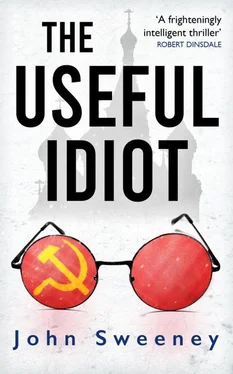John Sweeney - The Useful Idiot
Здесь есть возможность читать онлайн «John Sweeney - The Useful Idiot» весь текст электронной книги совершенно бесплатно (целиком полную версию без сокращений). В некоторых случаях можно слушать аудио, скачать через торрент в формате fb2 и присутствует краткое содержание. Город: London, Год выпуска: 2020, Издательство: Silvertail Books, Жанр: Исторический детектив, Триллер, на английском языке. Описание произведения, (предисловие) а так же отзывы посетителей доступны на портале библиотеки ЛибКат.
- Название:The Useful Idiot
- Автор:
- Издательство:Silvertail Books
- Жанр:
- Год:2020
- Город:London
- ISBN:нет данных
- Рейтинг книги:4 / 5. Голосов: 1
-
Избранное:Добавить в избранное
- Отзывы:
-
Ваша оценка:
- 80
- 1
- 2
- 3
- 4
- 5
The Useful Idiot: краткое содержание, описание и аннотация
Предлагаем к чтению аннотацию, описание, краткое содержание или предисловие (зависит от того, что написал сам автор книги «The Useful Idiot»). Если вы не нашли необходимую информацию о книге — напишите в комментариях, мы постараемся отыскать её.
* * *
The Useful Idiot — читать онлайн бесплатно полную книгу (весь текст) целиком
Ниже представлен текст книги, разбитый по страницам. Система сохранения места последней прочитанной страницы, позволяет с удобством читать онлайн бесплатно книгу «The Useful Idiot», без необходимости каждый раз заново искать на чём Вы остановились. Поставьте закладку, и сможете в любой момент перейти на страницу, на которой закончили чтение.
Интервал:
Закладка:
“That one was for the Cheka,” said the big man. When she had finished, he took one more drink, put down his glass and began to sing in his glorious gravelly bass.
“You will eat, bye and bye…”
Jones had heard the song before but he couldn’t quite place it.
“…In that glorious land above the sky…”
That’s it: they called it ‘The Preacher and The Slave’.
“Anarchist swine!”
The big man’s singing stopped as one of the Metropol’s oak bar stools connected with his head. Hefty as he was, he was no longer in his prime and he staggered under the blow, cannoning into Jones, spilling his beer. Instinctively, Jones ducked out from under the big man and raised his fists, eyeing the assailant – a tall, thin, red-faced man, a good head taller than Jones. He’d seen the man around, he was certain of it – a young American Communist activist and journalist called Fred Beal. Beal leered at Jones and swung at him, his fist connecting with Jones’ right cheek, just below the eye.
Stunned, Jones reeled back, swayed on his feet. For a moment, he feared that he was going to topple over. He staggered like a toddler taking his first uncertain steps, then remembered that he was a boxer and upped his pace. Suddenly he was dancing around the fallen bar stool.
He came at Beal: a left jab to the ribs, a second and a third, a right feint and then a flurry of punches, left, right, left, left, left, finishing off with a haymaker to Beal’s jaw that was so powerful the sound of the crack could be heard above the roaring crowd. Somehow still standing, Beal fell back. He turned his torso and, with a crash of breaking glass, he twisted to face Jones once more, a broken bottle of champagne in his hand.
Jones squared up to him, breathing hard. If Beal got lucky with the bottle, he could lose an eye.
Beal’s eyes darted to the far corner. Jones followed the direction and saw Lyushkov, taking in everything. Lyushkov glanced at Duranty, who only shook his head. Lyushkov relayed the message with his eyes – and Beal dropped the broken bottle. Seconds later, Dmitry, the biggest of the Metropol doormen, grabbed hold of Beal’s wrists and lifted him bodily away. Cheers, whoops and applause greeted the victor. The big man patted Jones gently on the shoulder.
“Some punch you got there, son,” said the big man.
Morgan Barnard appeared from nowhere. “Nice shiner.”
Jones looked up at the ceiling mirror and saw that his right cheek was turning midnight blue.
Duranty and Natasha joined them. “Come on, Jonesy, introduce me to your friend,” said Duranty.
Jones had no idea who the big man was.
“Introduce me to the Secretary-General of the greatest union the United States ever had,” said Duranty.
Still Jones had no clue.
“Big Bill was cleared of murdering Frank Steunenberg, ex-governor of Idaho, once Clarence Darrow established that the killer was a paid informant of the Cripple Creek Mine Owners’ Association.”
“Bill Haywood, the Wobbly defended by Clarence Darrow?” Jones asked.
“Man and boy.” The big man got two big beers, handed one to Jones and sunk half of his in one swig. Then, wiping the back of his hand against his mouth, he surveyed the room with his one good eye.
“Merry Christmas, Mr Haywood. I’m Gareth Jones. Western Mail , Cardiff.”
“Gareth Jones, Fighter,” corrected Haywood.
Smiling, Duranty explained to the women that Bill Haywood was the greatest Wobbly that had ever lived.
“Vot Wobbly?” asked Natasha.
“No-one is quite sure where name comes from,” Duranty explained. “But the Wobblies were the greatest trade union that ever existed in the United States.”
“The Wobblies are the greatest trade union,” corrected Haywood.
“True,” said Duranty, his smile growing broader. “They rose up in the western United States before the First World War. Mine-owners and factory bosses did their utmost to kill the union. Big Bill was framed for the murder of Steunenberg, the former governor of Idaho, even though he hadn’t been in the state at the time. Clarence Darrow is America’s great defence lawyer and he cleared him.”
“Fancy a trial where the defendant is found not guilty,” said Haywood, favouring Duranty with his dead eye. “Fancy that, Mr Duranty.”
“Quite so,” said Duranty and he spied Oumansky near the possible Christmas tree. “Morgan, darling, there’s somebody really quite important I’d like you to meet.” And, making his excuses, he, Natasha and Morgan moved away.
Jones turned to Haywood. “Do you miss America?” The moment he’d asked it he realised the question was too blunt.
Haywood winced, touched his head where the bar stool had hit him, and said, “Yup.”
“What do you miss?”
“The breakfasts. Eggs, ham, maple syrup, hash browns, lashings of it.” He leaned in to Jones and whispered, “When we were standing trial, we were in custody in Boise city jailhouse. Fancy banquets aside, food there was mighty better than pretty much every ordinary meal I’ve have had here.”
“Can you go back?”
“No. I ran from the Pinkertons framing me for a second time. I ran from the United States.” Again he leaned in to Jones, the conspirator once more. “Turned out I jumped from the frying pan into the fire.”
“Why do you say that?”
“Here in the Soviet Union, they have a saying, ‘You never know what happened yesterday.’ When I first came to Moscow in 1921, I was treated like a God. They fawned on me, hand on foot. Women, whisky, nothing was ever too much for an old Wobbly. But something’s changed. Something I did back then is now seen as a piece of badness. I ain’t changed. Russia has. Every time I leave my apartment, I’m followed. If I sneeze, three men in mackintoshes write it all down. If I sing Wobbly songs, I get hit. But I’m a Wobbly and I love to sing our old songs. I reckoned that, if I came to the swankiest bar in town on Christmas Eve and started to sing, it would be OK… but I was wrong.”
Out of the corner of his eye he noted Ilver, the commercial attaché from the British embassy, leaving the bar. Jones tried to catch up with him but, by the time he’d struggled through the throng, Ilver had disappeared. He returned to his place at the bar next to Haywood.
“May I ask you a question, Mr Jones?” said Haywood.
“Call me Gareth.”
“Garry,” Haywood went on, and Jones winced, “you report on Russia for your paper, right?”
“I do, Bill.”
“You tell the truth, what you see with your eyes and ears?”
Jones said nothing. Haywood reached for his wallet and pulled out a faded cutting from a newspaper.
“Someone gave me this. It’s from the London Times .”
Jones read. “Splendid illustrated magazines… crowds of brightly dressed well-fed happy looking workers are shown with their palatial dwellings… nobody who ever sees these publications will ever believe tales of a half-starved population dwelling in camps under the lash of a ruthless tyrant.”
The letter was signed George Bernard Shaw.
“You agree with Shaw?”
“Not necessarily. What is illustrated in magazines may not be true.”
“Stop sitting on the fence, Garry. What about what you write? Do you tell your readers about the stuff that doesn’t add up? The people crying for no reason? The terror of authority? The beggars? The people starving? The beautiful women who’d fuck anyone so long as they eat and stay out of trouble? You write about the Cheka?”
Jones stared into his beer.
“You a believer?”
“I’ve read a lot of Marx.”
“That ain’t any kind of answer to my question.”
Читать дальшеИнтервал:
Закладка:
Похожие книги на «The Useful Idiot»
Представляем Вашему вниманию похожие книги на «The Useful Idiot» списком для выбора. Мы отобрали схожую по названию и смыслу литературу в надежде предоставить читателям больше вариантов отыскать новые, интересные, ещё непрочитанные произведения.
Обсуждение, отзывы о книге «The Useful Idiot» и просто собственные мнения читателей. Оставьте ваши комментарии, напишите, что Вы думаете о произведении, его смысле или главных героях. Укажите что конкретно понравилось, а что нет, и почему Вы так считаете.












